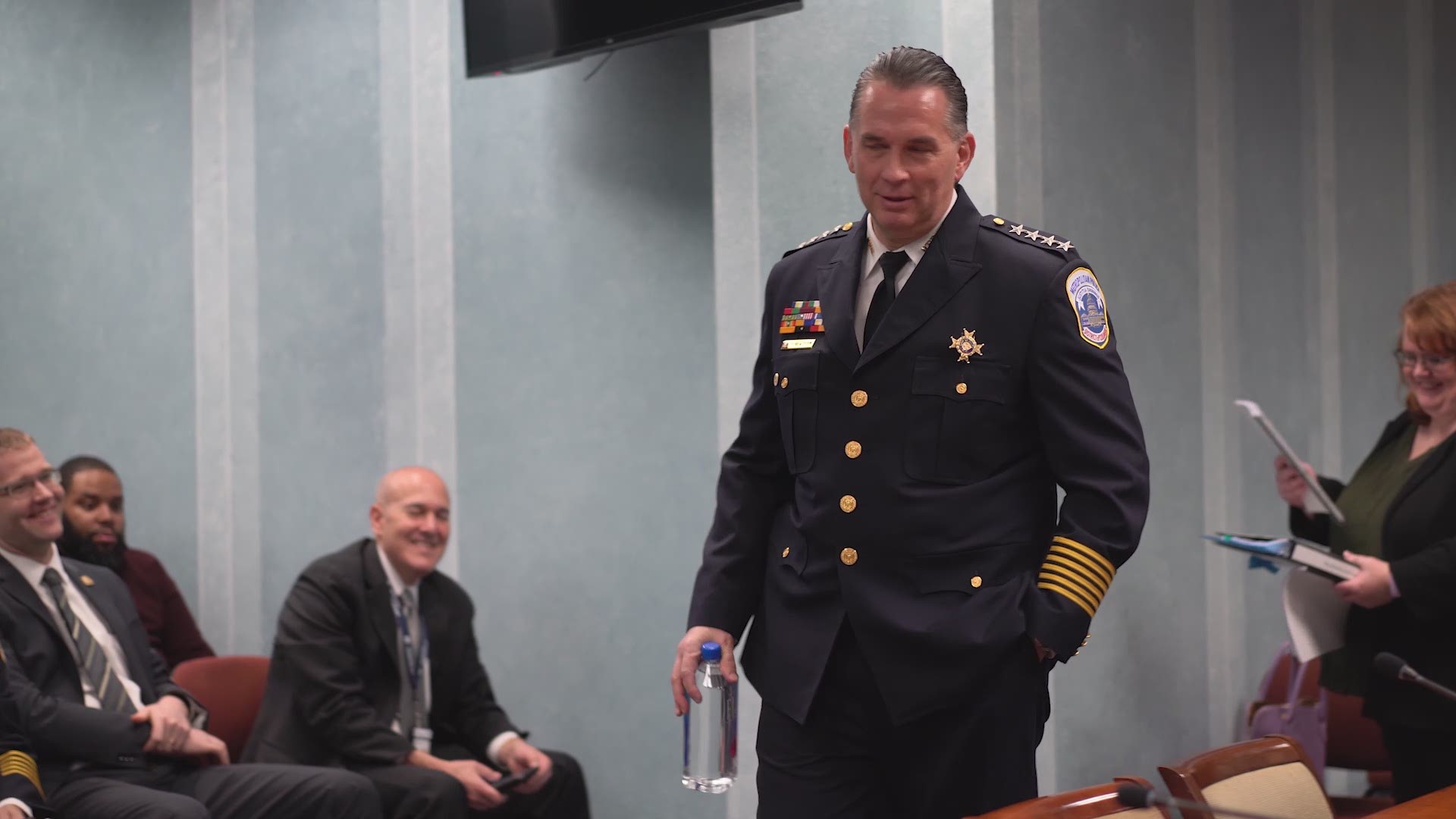WASHINGTON — D.C. Police Chief Peter Newsham confirmed on Thursday that the department has multiple internal investigations into crime underreporting. But, he denied a department wide effort to downgrade crimes.
“It cuts at our core principal of trust with the community that when we report out on crime statistics, we do it as accurately as we can,” Newsham said at MPD’s yearly performance oversight hearing in front of the D.C. Council’s Committee on the Judiciary and Public Safety.
The admission comes on the heels of a WUSA9 investigation into whistleblower allegations that D.C. Police supervisors are downgrading crimes to make the city’s crime stats look better.
Officer Tabitha Knight and Sergeant Charlotte Djossou discussed the alleged crime underreporting inside the DC Police Department on January 16th at a public hearing of the same committee Chief Newsham testified in front of Thursday.
In an exclusive interview with WUSA9, Sergeant Djossou, a 15-year MPD veteran previously honored for her service by Chief Newsham, detailed her claims DC police supervisors are ordering investigators to downgrade crime classifications form more serious crimes to less serious ones, all to make the city’s crime stats look better.
MPD whistleblower Sgt. Charlotte Djossou says the department is underreporting crimes to improve the city's stats. Watch below:
Djossou says internal police documents, handed over to Council and obtained by WUSA9, proves her case.
“It’s not ok to lie to the community about what’s going on around them,” Djossou told Chief Investigative Reporter Eric Flack.
Under questioning by Committee Chair, Councilmember Charles Allen, Chief Newsham said any instances of inappropriate downgrading of crimes is rare.
“We do not have a lot of circumstances where our police officers in my opinion are mis-classifying reports,” Newsham said. “It’s very unique and specific to the agency, and, like I said, command officials are acutely aware that they need to ensure that reporting is as accurate as it possibly can be.”
But, Chief Newsham said, it’s not unheard of either.
WUSA9 obtained an email written by a captain in the Fourth District instructing officers to stop using the classification of theft in the second degree when the value of the property stolen was under $25.
Instead, the captain said officers should use a charge you’ve probably never heard of: taking property without right. That’s an obscure crime designation that carries a maximum of three months in jail, rather than the six-month sentence that could come with a theft charge.
Newsham said an internal investigation found just shy of 200 cases in the Fourth District ended up with that lesser crime designation. He said the captain who gave the order felt it was unfair for low-level offenders to face the more serious theft charge.
Newsham said he’s not opposed to that idea, but added that it would require a citywide policy change, not a unilateral decision by a district captain.
“So the rationale for the decision I do not think was mean spirited, and I don’t think it was intentional in changing statistics,” Newsham said.
After that internal review, Newsham says all the cases that got that lower crime designation were returned to the more serious theft charges.
The whistleblowers also handed over cases they say should have been charged as felony assault with a dangerous weapon, that were actually classified as misdemeanor simple assault.
Newsham didn’t talk about those cases specifically on Thursday, but did tell Councilmember Allen that there have been a number of other internal investigations into alleged downgrading of crime classifications within MPD.
Newsham said he did not know the exact number of cases or the details, but he did tell Allen, his staff would pull all that information and get it to him as soon as they could.
Allen says for now, he’s satisfied crime underreporting is not a department-wide problem.
“I think the only pattern that we saw was reported in the Fourth District,” Allen said. “And I think we heard the chief and their investigations identify it. And then go make changes to it. So, I’m not hearing about any patterns. We would take it very seriously if we had evidence of big patterns.”
Chief Newsham said there is always going to be a gray area with some crime classifications, and that part of a supervisor’s job is to review how a crime was classified – especially in cases handled by less-experienced officers.
If an officer feels like their case was downgraded incorrectly, Newsham said it’s up to that officer to take it up the chain of command.


